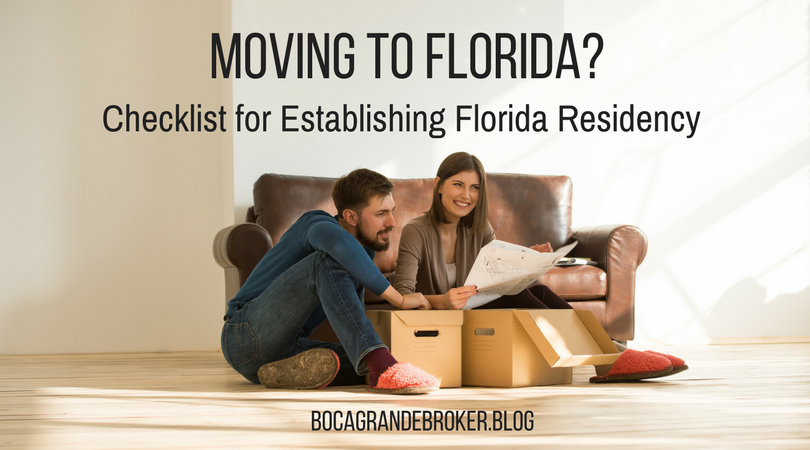Over 1,000 people a day are moving to Florida! If you are planning or considering the move, the check list below will help you in establishing residency in Florida.
Establishing Residency in Florida
There are many benefits for those moving to Florida in establishing residency. Learn more about estate taxes here. Consult local experts about estate planning and asset protection here.
Moving to Florida
- Accept Employment (when applicable)
Although it is obviously not necessary to work when moving to Florida, it can be helpful in establishing residency when moving from another state.
2. Notify the US Post Office and send Change of Address forms
3. File to Terminate Resident Status if you are leaving a state which collects State Income Tax or Estate Tax
4. File a Declaration of Domicile if you live in 2 different states
The Florida Declaration of Domicile must be signed by you in front of a Notary Public or Deputy Clerk of a Florida court and then recorded in the public records of the Florida county where you reside. A Declaration of Domicile confirms that it is your primary residence. Your signature on this document, once approved, confirms that you now reside in Florida, and that the state is your permanent residence.
5. Get a Florida Drivers’ License
If you drive and live in Florida, then you must have a valid Florida driver's license. you have 30 days after filing the Declaration of Domicile to get a Florida driver's license (you may get a Florida license with or without this declaration). See the Florida Department of Motor Vehicles for more information. Information on what to bring to get your license can be found here.
6. Register Your Out-of-State Car. Information here.
7. Register to Vote
8. File For A Homestead Exemption if you're a permanent resident (see FL statutes, consult local real estate attorneys)
9. Enroll children in a Florida school (if applicable)
10. Update your estate planning documents to comply with Florida law. Be sure to consult a Florida attorney as the estate laws in Florida, and who can or cannot leave your primary homestead residence to in a will or revocable living trust, can be a bit quirky.
*Disclaimer: None of the information provided by BocaGrandeBroker.com| BocaGrandeBroker.blog| or Carol Stewart Realtor should be used for legal purposes and no warranty is made regarding its accuracy or completeness. This information is presented for reference and informal purposes only. You should review the actual Florida Statutes and consult a legal professional for guidance regarding your particular situation.
Check with your Realtor® for up to date local information and details you'll need as you settle in to your new Florida home. It's important to have a reliable source to direct you to the right resources.



We are moving from Va. in March/April. I am retired , wife soon. What are the rules about registering legal firearms? We should have valid Va, CC permits by then.
Hi there,
In Florida, it is not necessary to register legal firearms. If you are going to conceal carry, you do need permitting for that.